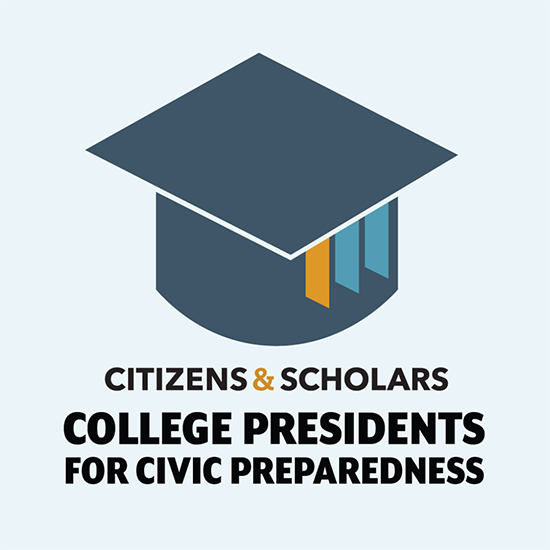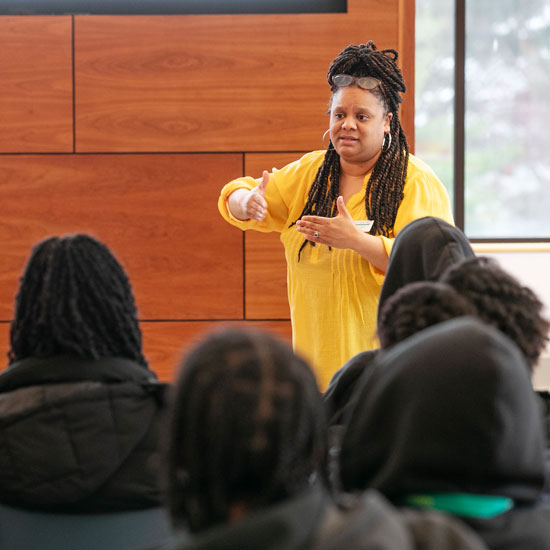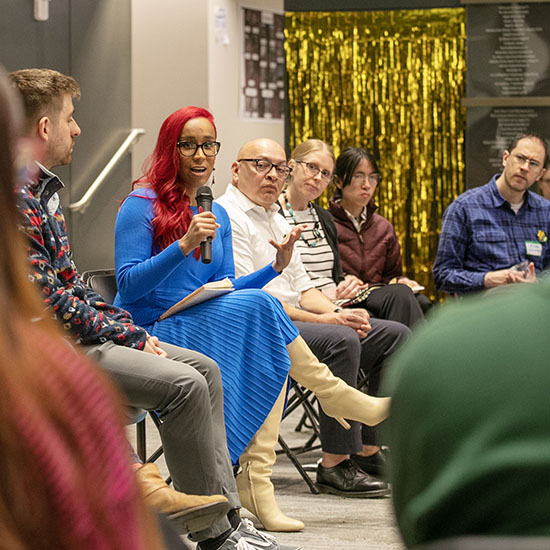Skidmore faculty offer global perspectives on the United States
Skidmore faculty members are encouraging students to take a deeper look at the role of the United States in the world by considering the international ramifications of events in the United States and global attitudes toward this country.
A recent Skidmore faculty panel, for instance, considered the presidency of Donald J. Trump and challenges raised to U.S. democracy during the siege of the Capitol earlier this year.
The forum, titled “Aftershock: Global Views of U.S. Democracy After Trump,” posed tough questions about the state of American democracy, perceptions of the United States from abroad and the notion of American exceptionalism.
“What happens in domestic politics in the United States has real-world implications for the world and, for instance, how democracy is perceived — the credibility of something like a democratic political system at the global level,” said Mahesh Shankar, associate professor and director of the International Affairs Program. “Those linkages need to be recognized."
You cannot pursue a democratic agenda abroad without also acknowledging democratic frailties at home.Mahesh Shankarassociate professor and director of the International Affairs Program
Rodrigo Schneider, assistant professor of economics, explored the implications of Trump’s rhetoric for Brazil. Schneider noted that President Jair Bolsonaro often endorsed Trump’s baseless allegations of electoral fraud and used them to raise similar questions about Brazil’s own voting system.
Schneider expressed concern that Bolsonaro, whose popularity has tumbled recently over his handling of the COVID-19 crisis, was likely to use arguments advanced by the Trump campaign during the 2020 U.S. elections as a playbook for 2022 elections in his own country.
“Brazil’s institutions will be put to the test next year,” Scheider said. “Bolsonaro took to heart the example of how to follow a U.S. leader.”
Jordana Dym, professor of history and director of Latin American and Latinx Studies, drew attention to the language used in the United States following the storming of the U.S. Capitol, including casual references by American politicians to the notion of a “banana republic.”
Dym noted that the troubling term, which can be dated back to growing U.S. ascendency and imperialism in Latin America in the early 20th century, only came into common use many decades later during the Cold War.
“Words really matter. The vocabulary that people, especially politicians, use has weight in the world,” Dym said. “It’s time to relearn history, time to reexamine the evidence, time to make very clear that when we’re making claims about other places ... that those claims may no longer reflect the realities of those places.”
Pushkala Prasad, professor of management and international affairs, considered views of the United States from the outside and how those views have affected U.S. presence in the world. She described many foreign policymakers’ views — including those in allied nations — as “vacillating between a deep sense of unease and extreme irritation.”
“What this translates to is a sense, in the long term, of the United States as an unreliable partner” on issues such as the Iran nuclear deal, Prasad said. “This is making countries in Europe, Australia, Japan, India, South Korea and Singapore extremely nervous about long-term relationships and forcing them not only to recalibrate their relationships with the United States but also to recalibrate their relationships with other countries .. In other words, they’re hedging their bets.”
Such attitudes are likely to diminish leadership in the long term, Prasad said. She also described increasing irritation over U.S. inability to tackle issues such as white supremacy and rampant conspiracy theories, which in some cases have spread to European nations.
“America, the much-fabled crucible of democracy, is becoming the site of a new anti-democratic virus that is infecting significant pockets in Europe — at least that is how many people see it,” Prasad said.
The March 17 event was moderated by Michael Orr, dean of the faculty and vice president of academic affairs.


